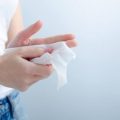Are chemical-free diapers the best diapers
When we become a baby mother, we will choose the most suitable daily necessities for the baby to use. Whether it is day or night, diapers are essential products for babies. Diapers are items that directly touch the skin of the baby’s private parts, Therefore, in the selection of nappies, the comparison is made with healthy, non-toxic, dry and soft, good absorption, strong air permeability, and free movement. There are many types of diapers, including disposable diapers, biodegradable diapers, cloth diapers, and chemical-free diapers. If you want to find a diaper that does not contain certain chemicals or is more environmentally friendly, this article will be very helpful to you. With the development of the times and people's needs, more parents start to use chemical-free diapers. So are chemical-free diapers the best diapers for babies?

What are chemical-free diapers?
At present, many diapers use chemicals and irritants, such as chlorine, which can cause damage to the baby's sensitive skin, and even cause skin redness, inflammation, and rash, which are unbearable for parents. Even some natural and organic diapers will have a chemical smell. Chemical-free diapers are also called non-toxic diapers. They do not contain any chemical substances and will not irritate the baby's skin. They are hypoallergenic diapers. For babies with sensitive skin, chemical-free diapers are the best diapers for sensitive skin. Many kinds of diapers are used when babies grow up, and most diapers made of chemically synthesized materials may stay in landfills for hundreds of years, affecting many generations. Chemical-free diapers are more likely to be decomposed by nature and have less impact on the environment and future generations. In general, chemical-free diapers are skin-friendly and environmentally friendly diapers.
Why do we choose chemical-free diapers?
Chemical-free diapers refer to disposable chemical-free diapers. We all know that the common disposable diapers are very absorbent, some people name them the most absorbent diapers. these most absorbent nappies contain SAP(Super Absorbent Polymer), This material can absorb water up to 100 times its own weight and is used in the absorbent core of disposable diapers. It forms gel crystals and creates surface tension in the diaper lining to prevent leakage. If you have ever changed your baby's nappies, you may have seen gelatinous beads sticking to your baby's skin. Direct contact of these crystals with the skin for a long time may cause slight skin irritation and breathing problems. Some of the disposable chemical-free diapers use plant-based pulp from the forest for absorption, and some use fluff pulp that is continuously harvested and are manufactured without bleaching. Chemical-free nappies have super soft plant-based inner and outer layers to form a comfortable and soft contact surface. Although chemical-free diapers are not as absorbent as disposable diapers containing SAP, they have the least irritation to the baby’s skin and the least damage to the environment. It is better to use plant materials to touch the baby's skin than plastic.

How to choose chemical-free diapers?
No chlorine:In disposable diapers, manufacturers use chlorine to bleach the diapers to make them whiter. Bleaching agents are highly irritating to human skin and are related to asthma, allergies, environmental toxicity, and cancer. Moreover, during the bleaching process, it will release a small number of toxic chemicals, dioxins, which are highly toxic and can damage the human immune system. The skin and body of a newborn baby are very fragile, and every parent does not like the baby being exposed to such an environment. For your baby’s health, it is best to use diapers made of complete chlorine-free pulp to ensure that these diapers do not have toxic chemicals after bleach treatment, so when buying safer and healthier diapers, the first thing you should consider are those marked with Diapers with "unbleached" or "chlorine-free" diapers.
No fragrance:Many disposable nappies have some fragrances. These fragrances are used to cover up the smell of feces or chemical odors. Although parents may be smell good, many babies are sensitive to it. A number of studies have shown that chemicals used to make fragrances are classified as allergens, hormone disruptors, asthma triggers, neurotoxins, and carcinogens. To make matters worse, aromatic products usually also contain phthalates, which help the scent persist and can damage the endocrine system. Generally, good diapers with high safety are fragrance-free. To be honest, diapers smell good only before the baby poops, and perfume can't cover up the smell of feces! So for the baby’s sake, try to choose diapers that are not scented.
No dye:Parents sometimes choose to buy baby diapers with nice and cute patterns, but these dyes are potentially dangerous to the baby. The pigments contain various chemical substances. When these dyes touch the baby’s skin, it may cause allergic reactions, Even the baby touched the diaper with his hand and then suck the hand, these chemicals will go into his mouth. The study in the journal Pediatrics showed that changing to a dye-free diaper can eliminate the rash caused by colored diapers. When buying diapers, choosing dye-free diapers is better for your baby.
Chemical-free diapers can protect babies from potential injuries, but they also have some disadvantages, so they are not the best diapers. There is no diaper that can be claimed to be the best, only whether it is the most suitable diaper for the baby. Chemical-free diapers are generally free of chlorine, fragrance, and pigments. Pay attention to these points in the selection of these diapers, you can give the baby a healthier and safer growth environment. Henan Yessain Health Technology focuses on the production, development, and sales of baby diapers. Our company can customize most types of diapers on the market and add raw materials according to your requirements. If you want more product information, please contact us.




